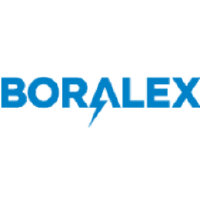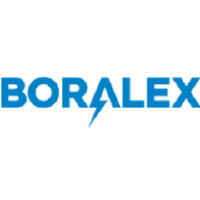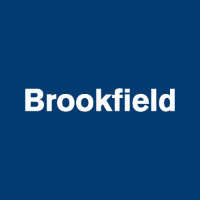
Boralex Inc
TSX:BLX

Profitability Summary
Boralex Inc's profitability score is hidden . We take all the information about a company's profitability (such as its margins, capital efficiency, free cash flow generating ability, and more) and consolidate it into one single number - the profitability score. The higher the profitability score, the more profitable the company is.
Profitability Score
We take all the information about a company's profitability (such as its margins, capital efficiency, free cash flow generating ability, and more) and consolidate it into one single number - the profitability score. The higher the profitability score, the more profitable the company is.
We take all the information about a company's profitability (such as its margins, capital efficiency, free cash flow generating ability, and more) and consolidate it into one single number - the profitability score. The higher the profitability score, the more profitable the company is.
Profitability Score
Margins
Earnings Waterfall
Boralex Inc

Margins Comparison
Boralex Inc Competitors

| Country | Company | Market Cap |
Gross Margin |
Operating Margin |
Net Margin |
||
|---|---|---|---|---|---|---|---|
| CA |

|
Boralex Inc
TSX:BLX
|
2.8B CAD |
Loading...
|
Loading...
|
Loading...
|
|
| CN |

|
China Yangtze Power Co Ltd
SSE:600900
|
635.7B CNY |
Loading...
|
Loading...
|
Loading...
|
|
| ID |
B
|
Barito Renewables Energy PT Tbk
IDX:BREN
|
1 043.5T IDR |
Loading...
|
Loading...
|
Loading...
|
|
| CN |

|
Huaneng Lancang River Hydropower Inc
SSE:600025
|
164.9B CNY |
Loading...
|
Loading...
|
Loading...
|
|
| CN |

|
China Longyuan Power Group Corp Ltd
HKEX:916
|
158.8B HKD |
Loading...
|
Loading...
|
Loading...
|
|
| IN |

|
Adani Green Energy Ltd
NSE:ADANIGREEN
|
1.6T INR |
Loading...
|
Loading...
|
Loading...
|
|
| CN |

|
China Three Gorges Renewables Group Co Ltd
SSE:600905
|
117.5B CNY |
Loading...
|
Loading...
|
Loading...
|
|
| ES |
E
|
EDP Renovaveis SA
ELI:EDPR
|
14B EUR |
Loading...
|
Loading...
|
Loading...
|
|
| RO |

|
Societatea de Producere a Energiei Electrice in Hidrocentrale Hidroelectrica SA
F:E28
|
13.2B EUR |
Loading...
|
Loading...
|
Loading...
|
|
| CN |

|
Sichuan Chuantou Energy Co Ltd
SSE:600674
|
68.2B CNY |
Loading...
|
Loading...
|
Loading...
|
|
| BM |

|
Brookfield Renewable Partners LP
TSX:BEP.UN
|
12.5B CAD |
Loading...
|
Loading...
|
Loading...
|
Return on Capital
Return on Capital Comparison
Boralex Inc Competitors

| Country | Company | Market Cap | ROE | ROA | ROCE | ROIC | ||
|---|---|---|---|---|---|---|---|---|
| CA |

|
Boralex Inc
TSX:BLX
|
2.8B CAD |
Loading...
|
Loading...
|
Loading...
|
Loading...
|
|
| CN |

|
China Yangtze Power Co Ltd
SSE:600900
|
635.7B CNY |
Loading...
|
Loading...
|
Loading...
|
Loading...
|
|
| ID |
B
|
Barito Renewables Energy PT Tbk
IDX:BREN
|
1 043.5T IDR |
Loading...
|
Loading...
|
Loading...
|
Loading...
|
|
| CN |

|
Huaneng Lancang River Hydropower Inc
SSE:600025
|
164.9B CNY |
Loading...
|
Loading...
|
Loading...
|
Loading...
|
|
| CN |

|
China Longyuan Power Group Corp Ltd
HKEX:916
|
158.8B HKD |
Loading...
|
Loading...
|
Loading...
|
Loading...
|
|
| IN |

|
Adani Green Energy Ltd
NSE:ADANIGREEN
|
1.6T INR |
Loading...
|
Loading...
|
Loading...
|
Loading...
|
|
| CN |

|
China Three Gorges Renewables Group Co Ltd
SSE:600905
|
117.5B CNY |
Loading...
|
Loading...
|
Loading...
|
Loading...
|
|
| ES |
E
|
EDP Renovaveis SA
ELI:EDPR
|
14B EUR |
Loading...
|
Loading...
|
Loading...
|
Loading...
|
|
| RO |

|
Societatea de Producere a Energiei Electrice in Hidrocentrale Hidroelectrica SA
F:E28
|
13.2B EUR |
Loading...
|
Loading...
|
Loading...
|
Loading...
|
|
| CN |

|
Sichuan Chuantou Energy Co Ltd
SSE:600674
|
68.2B CNY |
Loading...
|
Loading...
|
Loading...
|
Loading...
|
|
| BM |

|
Brookfield Renewable Partners LP
TSX:BEP.UN
|
12.5B CAD |
Loading...
|
Loading...
|
Loading...
|
Loading...
|

